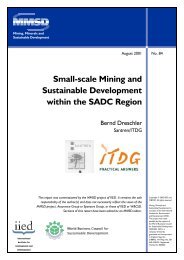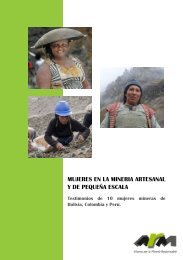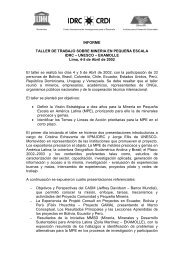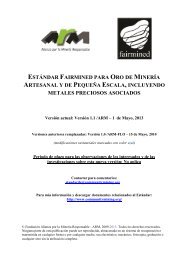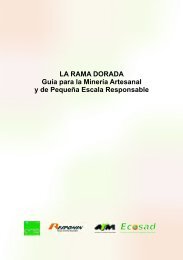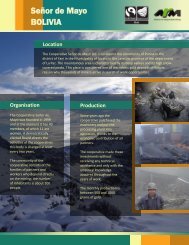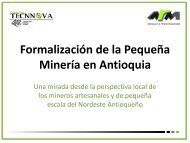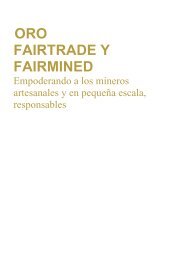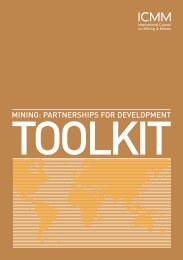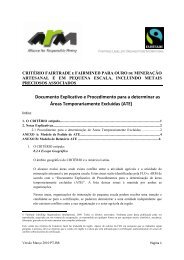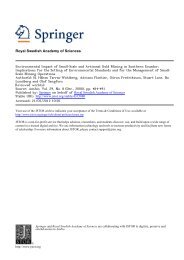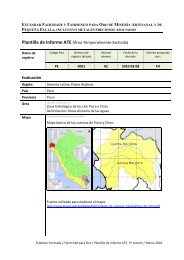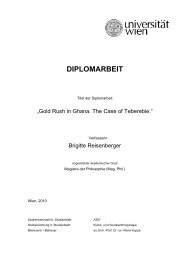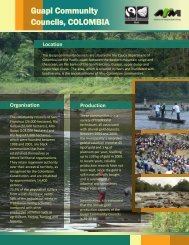A Poisonous Mix - Human Rights Watch
A Poisonous Mix - Human Rights Watch
A Poisonous Mix - Human Rights Watch
You also want an ePaper? Increase the reach of your titles
YUMPU automatically turns print PDFs into web optimized ePapers that Google loves.
Despite these shortcomings, the action plan has created an opportunity to improve the<br />
lives of over two million children working in harmful conditions in Mali. It remains<br />
uncertain whether the government itself will fully support the action plan, at the risk of<br />
hurting the interests of influential economic operators. The government also faces the<br />
challenge of securing sufficient financial support for the US$100 million plan. 237<br />
Donor and NGO Programs on Child Labor<br />
The Role of Donors in Addressing Child Labor<br />
Most programs on child labor in Mali are donor-funded and have recently experienced<br />
drastic cuts. Until 2010, the US provided significant funding to ILO/IPEC in Mali, which<br />
implemented child labor programs through Malian partner NGOs. 238 One ILO/IPEC program<br />
included a regional study on artisanal mining in Mali, Niger, and Burkina Faso, and efforts<br />
to withdraw children working artisanal gold mining in all three countries. 239 Unfortunately,<br />
the US has stopped funding child labor programs in Mali since the start of 2011. This<br />
situation was not specific to Mali: US funding to IPEC programs around the world was<br />
reduced from US$49 million in 2010 to US$27 million in 2011. 240<br />
The European Commission (EC) has been another major donor for ILO/IPEC in Mali for<br />
several years, but has decided to cut funds. In 2011, the EC will fund ILO/IPEC in Mali with<br />
US$202,000, less than half of its support in 2010. 241 The EC funds an ILO/ IPEC project<br />
called TACKLE, which aims to move children from work to school in Mali and 10 other<br />
countries, and which addresses child labor in mining. 242 Other bilateral and NGO donors<br />
also fund child labor programs in Mali, including the Netherlands and Spain. 243<br />
237 Email communication from Boucary Togo, director of the National Unit to Combat Child Labor, to <strong>Human</strong> <strong>Rights</strong> <strong>Watch</strong>,<br />
July 28, 2011.<br />
238 International Labour Organization, “Supplement to the IPEC Implementation Report,” March 2011,<br />
http://www.ilo.org/ipecinfo/product/viewProduct.doproductId=16255 (accessed August 3, 2011), p. 26. In 2010, the US<br />
funded ILO/IPEC in Mali with US$465,000; in 2011, it stopped funding ILO/IPEC in Mali.<br />
239 US Department of Labor, “ILAB in Mali”, undated, http://www.dol.gov/ilab/map/countries/mali.htm (accessed<br />
August 9, 2011); ILO, “Evaluation Summaries; Support for the Preparation of the Mali Time-Bound Programme,” undated,<br />
http://www.ilo.org/wcmsp5/groups/public/---ed_mas/---eval/documents/publication/wcms_126888.pdf (accessed<br />
August 9, 2011).<br />
240 ILO, “Supplement,” p. 31.<br />
241 ILO, “Supplement,” p. 26.<br />
242 ILO, “Tackle child labor through education: moving children from work to school in 11 countries,” undated,<br />
www.ilo.org/ipecinfo/product/download.dotype=document&id=8511 (accessed August 14, 2011)<br />
243 ILO/IPEC, IPEC action against child labour – Highlights 2010, (Geneva: ILO, 2011),<br />
http://www.ilo.org/ipecinfo/product/viewProduct.doproductId=15735 (accessed August 9, 2011); <strong>Human</strong> <strong>Rights</strong> <strong>Watch</strong><br />
interview with Fatou Keita and Almoustapha Touré, ILO/IPEC, Bamako, March 31, 2011.<br />
55 HUMAN RIGHTS WATCH | DECEMBER 2011



